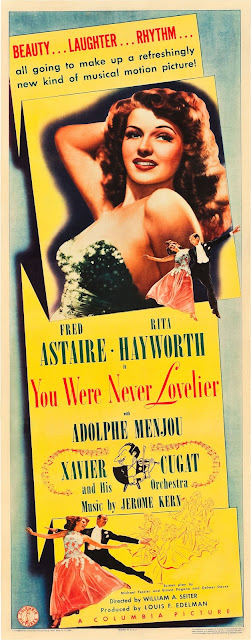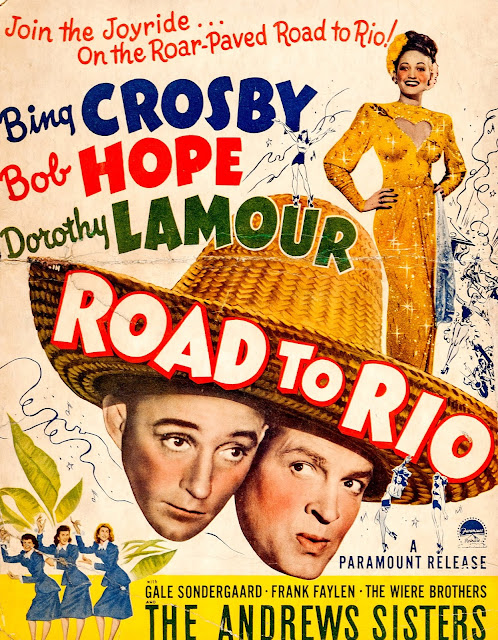8 Classic Films to Watch in Anticipation of Twin Peaks
In less than 24 hours (!), the third season of Twin Peaks will be upon us. Two years ago, I spent my winter break cross-stitching and binge-watching David Lynch's stellar TV show and ever since then I've been enamored. I can't imagine being one of those fans who have waited over twenty years for this revival because two years has already seemed like an eternity to me. To celebrate the return of Agent Cooper and the townspeople of Twin Peaks, I've been rewatching the first two seasons but I also thought it might be fun to come up with a list of classic movies that could act as a sort of companion to the show. This was a little tricky since Twin Peaks is pretty singular -- its blend of comedy, horror, melodrama, and murder mystery with a generous dose of the supernatural is not something you're likely to find in Hollywood's Golden Age. But hey, I tried.
Spoilers abound!
Laura (1944)
Before David Lynch had us asking "Who killed Laura Palmer?" Otto Preminger had audiences wondering "Who killed Laura Hunt?" A sleek film noir, Laura is bursting with atmosphere. Although it's much more ritzy and high-class than the simpler, homespun environment of TP, both works focus on the tragic murder of a beautiful girl and the detective who comes in to solve the case. Dana Andrews's Mark McPherson and Kyle MacLachlan's Agent Cooper become immersed in the mystery as they find themselves touched by the victim and the senselessness of the crime.
Rebecca (1940)
Laura Palmer could be called Lynch's Rebecca de Winter. We never see her physically in the show except for the very first scene when her body is discovered. For the rest of the series, the audience can only piece together who Laura was by secondhand information like photographs, video footage, cassette tape recordings, and the stories from other characters. Hitchcock's Rebecca doesn't show its titular antagonist, but it doesn't have to; her presence clings to every frame and influences every character. The same thing applies to TP -- to an extent. The intrigue over Laura's death is why the show became so successful, but after a while, other plots come in that grab our attention. Still, almost everyone will tell you that once the homecoming queen's murder was solved, viewers lost interest and TP suffered.
Anyway, Laura and Rebecca are somewhat similar. They appeared to be sweet, perfect women, but as we learn more, we realize that they were much darker and sinister than we thought. Sex and other vices were extremely present in their lives. In the end, both were discovered in bodies of water due to shocking circumstances. In another weird coincidence, Laura has the letter "R" under one of her fingernails, recalling the numerous times we see Rebecca's initials, including that memorable final shot.
All That Heaven Allows (1955)
As I said before, TP is a mixture of genres, but in my opinion, I think the most prominent genre is melodrama (at least in the first season). When people experience emotions on this show, they experience them. The pilot is a prime example -- when Laura's parents are told about their daughter's death, they sob, scream, and moan. Before Laura's best friend Donna is even informed about the tragedy, she surmises what has happened and begins fiercely crying. TP is a meditation on grief. There are many poignant moments where we are reminded that Laura isn't just a plot device, she was real to these characters and to this world.
I could have picked any of Douglas Sirk's excellent melodramas to go with TP, but I decided on All That Heaven Allows because of two things: it contemplates loss and it examines the dark underbelly of suburbia. The white picket fences and the gorgeous exteriors suggest happiness and prosperity, but behind all of that is angst, repression, horrific gossip, and loneliness. The small-town life of Twin Peaks is the same -- everyone has secrets and surprising connections are revealed all the time. In other words, the owls are not what they seem.
Rebel Without a Cause (1955)
Teenagers always have a lot to deal with, but none more so than the teenagers found in Rebel Without a Cause and TP. They grapple with heavy issues like abandonment, awful parenting, and psychological damage. They're put into very adult situations, such as Plato's death and Shelley's marriage to abusive Leo. These kids are forced to grow up fast.
James Hurley and Bobby Briggs definitely bring to mind the iconic imagery of James Dean. Both guys wear leather jackets, but whereas James sensitively broods, Bobby is more cocky and outrageous. It's like Lynch took different parts of Dean's persona and instilled them in these two characters.
Double Indemnity (1944)
To be honest, Billy Wilder's superb movie could probably be replaced with numerous other films noir and still function the same in its relation to TP. I say this because TP likes to play with the femme fatale a bit. Audrey Horne is the first femme who comes to mind, but she isn't exactly leading men to their doom -- she likes to tease and she certainly likes to be in power, but I wouldn't say she is malicious. (Her flirtation with Agent Cooper is actually one of my favorite parts of the series. So amazing.) In episode one of season two, Donna goes through a strange, unexplained phase where she tries to be like Audrey by smoking, planting a steamy kiss on James, and wearing sunglasses to add to her "mysterious" aura. And then there's the ill-conceived subplot in the same season when James leaves Twin Peaks and becomes embroiled in a woman's plot to kill her husband.
Like many noirs, TP also dabbles in greed, corruption, crime, and sex, usually in the form of extramarital affairs. While Double Indemnity is one of the best noirs and therefore always a good choice, I chose it because I'm pretty sure Lynch referenced it near the end of season one when Catherine has a meeting with an insurance agent who comes to her house so she can sign her life insurance policy, a policy that was taken out without her knowledge. The agent's name? Mr. Neff.
That Darn Cat! (1965)
So, this probably seems like an odd choice. However, I do have my reasons. First of all, That Darn Cat! is about a woman (Hayley Mills) whose cat becomes an asset for an FBI investigation. Agent Zeke Kelso (Dean Jones) has to follow the cat around while also resisting the advances of its owner. Not only did TP have a moment where the police had to rely on a talking bird as a witness, it also has the aforementioned relationship between a precocious young woman and an FBI agent. TP is very dramatic, but it boasts a sly, quirky sense of humor, too. That Darn Cat! is less subtle, yet both of them offer great scenes of physical and visual comedy. Other than that, yeah, these works are pretty much night and day.
West Side Story (1961)
Like Rebel Without a Cause, West Side Story is about teenagers who go through terrible, mature situations that end in heartbreak and/or death. Although I would never label it a musical, TP is very connected to its score and musical performances often happen spontaneously. Julee Cruise will be shown crooning at the Roadhouse; Leland energetically sings "Get Happy" before dissolving into tears; Ben and his brother Jerry break into impromptu dancing when Leland enters Ben's office singing a random nursery rhyme.
Okay, time for the more obvious relationship between West Side Story and TP: Richard Beymer and Russ Tamblyn. It absolutely blew my mind when I found out these men were a part of TP as Ben and Dr. Jacoby. And they're both back for the revival! Huzzah!
How cute are they?!
Vertigo (1958)
When Laura's cousin Maddy appears halfway through season one, it doesn't take much for Vertigo to pop into your head -- I mean, Maddy is short for Madeleine after all. Played by the same actress, Maddy and Laura are the spitting image of each other. Similar to Vertigo's Judy and Madeleine, the girls are differentiated by their hair color, slight appearance alterations like Maddy's glasses, and their personalities. Maddy/Madeleine is more demure and innocent, while Laura/Judy is tougher and more street-smart. Both sets of women wind up murdered in a way that mirrors their twin. Not exactly the happiest comparisons to make, but there you are.
______________________
______________________
What other classic films would you suggest? I'm sure there are plenty that I missed. I didn't even touch on the surreal, supernatural aspects that make TP so unique. In the meantime, pour yourself a damn fine cup of coffee, get a jelly doughnut or a piece of cherry pie, and enjoy the all-new Twin Peaks! I know I will.























What an excellent and thoughtful post! Twin Peaks is my absolute favourite TV series, and these are perfect film choices that complement the vast nature of comedy, drama, noir, and romance that encompass this brilliant series.
ReplyDeleteThanks! Writing this list was completely impromptu, so I'm happy that you enjoyed it. I think I would have to list Twin Peaks in my top five favorite shows. Hopefully this new season doesn't disappoint!
Delete